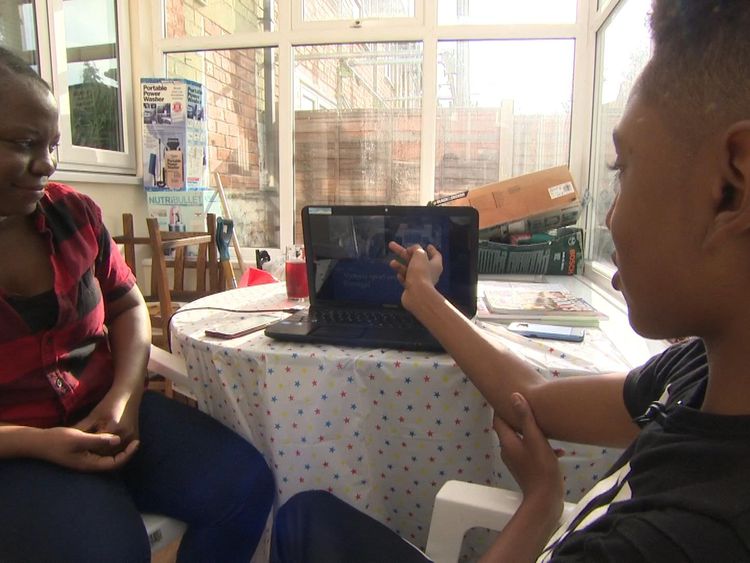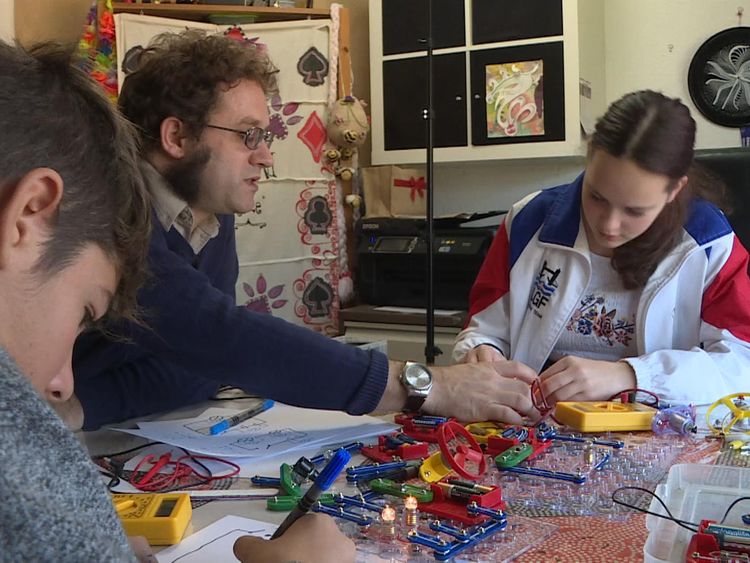Home schooling on the rise over fears of expulsion
Freedom of Information requests to councils and local authorities across the UK revealed that, since 2013, there has been a 242% increase in the number of home-educating parents who cite “avoiding or facing permanent exclusion” when they remove their child from school.
Natalie Walker decided to home school her son earlier this year.
Jay, 12, had been at secondary school but was experiencing problems there that made him anxious and depressed and, as a consequence, he had begun lashing out in class.
Ms Walker told Sky News: “The talk about a managed move started quite quickly, and I just knew where that would end up: with him in a Pupil Referral Unit and I just didn’t want that for Jay.”
Ms Walker is a single mum who works from home.
For her, the choice to home educate wasn’t easy, but it was the right one.
“I didn’t feel sending him to another school would help because of the emotional baggage he had by that point, and I’d lost faith in the mainstream system by that point, if I’m honest,” Ms Walker said.
“At first I was nervous about being with him all day, every day, but once I started connecting with the groups that were available, I didn’t realise, it was a whole new world that opened up.”
The number of children in home education has risen by 78% since 2013, with an estimated 45,000 children now been educated outside of a traditional school environment.
For the Walker family, a decision made in desperation is working.
“It’s really fun, it’s actually more enjoyable than school,” Jay told Sky News.
“I feel like people who are at school, they should be home schooled too. Because I’m living a life of happiness.”
Ms Walker says she feels like she has her son back: “For me that’s the main thing. That happy lad – he’s back now. School had stripped that from him.”
Sky News’ figures show that “religion, culture and philosophy” are the still the most common reasons given for home education and that white, British families make up the majority of home educators.
By law, a parent must ensure their child receives an education that’s suitable for their age, ability and aptitude.
That can be in a school or otherwise.
In south London, mum Samia Tossio hosts a weekly science and maths lesson for her son Isaac, who is 13, and other local home-schooled children.
She employs a specialist maths and science tutor who comes with equipment for the children to do experiments around the dining room table.
“I’m not a teacher, I’m not trying to replace teachers, I think many of them do a good job,” Ms Tossio said.
“I’m just doing what I am legally allowed to do, which is to educate my child otherwise than at school.”
Jae Avery, whose daughter attends the session, says the existence of groups like this helps mitigate the impact of a child not being in a bigger school environment.
“People seem to be very concerned about socialising,” Ms Avery told Sky News.
“I don’t know any home-educated child who isn’t socialised really, they are all very socialised.”
To access higher education, many children who are taught at home will take mainstream exams but otherwise what they learn in these lessons is driven by the pupils’ interests.
Home educators have no set curriculum or exams and teaching does not necessarily have to be done by the parent or in the home.
“I love the freedom, obviously I don’t do whatever I want, but the ability to do what I want is just amazing,” one student said.
Unless there are safeguarding issues, or welfare concerns, local authorities can only conduct “informal checks” on home-educating parents and their children.
But earlier this year, the Department for Education opened a consultation to see whether there should be greater powers given to councils to allow them to check what education parents are providing.
They are also investigating whether they should be a compulsory register introduced for all home-educated children, which would enable children to be tracked and monitored more easily.
But it’s something some home-educating parents feel is unnecessary and unfair.
“The only register in this country at the moment for people is the sex offenders register,” Ms Tossio said.
“So do parents have to be on a register to home educate?”
But Sky News spoke to Hashim Aziz, now aged 23, whose experience of home education has left him thinking there does need to be better regulation of parents who choose to home educate.
Mr Aziz’s father took him out of school aged eight.
Hashim says his father tried his best but, a combination of ill health and inexperience meant there wasn’t much education.
“We basically sat in our rooms, with the books and were expected to get on with it and teach ourselves,” he said.
“As you can imagine for a kid who is quite sheltered at that point I didn’t really understand the value in education, it didn’t really accomplish much at all.”
Mr Aziz has now entered part-time college and is studying for a maths GCSE so that he can enter higher education, but he feels he is behind his peers.
He said: “I could have already been accomplishing things at this point. Rather than being 23 and likely to get into university at maybe 27, 28 at this point.
“I’m always playing catch-up.”
Source: Read Full Article




